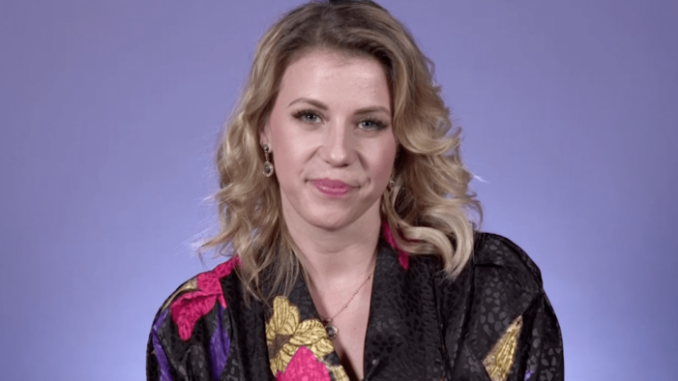
Jodie Sweetin has always been candid about the challenges she’s faced in her personal life. Now, as a mother and advocate, she’s turned her attention to the growing pressures of social media on children. With her characteristic honesty and compassion, Jodie has shared her concerns about how platforms like Instagram, TikTok, and Snapchat are shaping kids’ self-esteem, mental health, and sense of reality.
In this article, we’ll explore Jodie’s thoughts on this critical issue, diving into her most poignant insights while offering practical advice for parents navigating the digital age.
Understanding Social Media’s Grip on Kids
The Digital Playground: A Blessing or a Curse?
Social media has become the new playground for kids, but instead of swings and slides, they’re navigating likes, shares, and filters. Jodie Sweetin believes that while these platforms can foster creativity, they often create unrealistic expectations for young minds.
The Rise of Comparison Culture
Jodie has expressed her concern about how social media promotes constant comparison. Kids are bombarded with curated highlights, leading them to question their own worth. She’s called it “a thief of joy” for children who are still discovering themselves.
Jodie’s Perspective as a Mom
Parenting in the Digital Age
As a mother, Jodie understands the fine line between allowing her kids to explore technology and protecting them from its harmful effects. She often discusses the importance of setting boundaries to ensure a healthy relationship with social media.
The Pressure to Be Perfect
Jodie has shared how social media amplifies the pressure to appear perfect. She worries about how this affects kids’ mental health, leading to anxiety, depression, and even body image issues.
The Hidden Dangers of Social Media
Cyberbullying: The Silent Threat
One of Jodie’s primary concerns is the rise of cyberbullying. Unlike traditional bullying, this follows kids home, making it inescapable. Jodie believes this is one of the most damaging aspects of social media for today’s youth.
The Addiction Factor
Jodie has highlighted how addictive social media can be, comparing it to a slot machine designed to keep kids hooked. This constant need for validation can disrupt sleep, schoolwork, and even family time.
Unrealistic Beauty Standards
Social media often promotes unattainable beauty standards. Jodie has pointed out how filters and editing tools distort reality, leaving kids feeling inadequate in their own skin.
Finding Solutions: Jodie’s Advice to Parents
Open Conversations Are Key
Jodie encourages parents to have honest conversations with their kids about social media. Instead of banning it outright, she suggests discussing its pros and cons openly.
Setting Digital Boundaries
She advocates for setting screen time limits and encouraging tech-free zones, such as during family meals or before bedtime.

Encouraging Real-Life Connections
Jodie believes that fostering real-life friendships and hobbies can help counteract the isolating effects of social media.
Social Media and Mental Health
Identifying Warning Signs
Jodie has urged parents to watch for changes in behavior, such as withdrawal, anxiety, or a sudden obsession with appearance. These can be signs that social media is affecting their child’s mental health.
Seeking Professional Help
If social media’s impact becomes overwhelming, Jodie recommends seeking support from therapists or counselors who specialize in adolescent mental health.
Jodie’s Call to Action for Society
Holding Platforms Accountable
Jodie has called for greater accountability from social media companies. She believes they have a responsibility to protect young users by implementing stricter policies against harmful content.
Advocating for Digital Literacy
Sweetin has emphasized the need for digital literacy education in schools. Teaching kids how to navigate the online world responsibly can empower them to make healthier choices.
Balancing the Scales
Teaching Kids to Use Social Media Mindfully
Jodie encourages parents to teach kids to think critically about what they see online. Understanding that not everything is as it seems can help them navigate social media more confidently.
Leading by Example
As a public figure, Jodie strives to model healthy social media habits. She believes that parents can do the same by showing their kids how to use technology responsibly.
Conclusion: Protecting Our Kids in a Digital World
Jodie Sweetin’s insights into the growing pressures of social media on kids are a wake-up call for parents, educators, and society at large. While social media is an integral part of modern life, it’s crucial to ensure it doesn’t harm the next generation’s mental health and self-worth. By fostering open conversations, setting boundaries, and advocating for systemic change, we can help kids navigate the digital world with confidence and resilience.
FAQs
1. What concerns does Jodie Sweetin have about social media and kids?
Jodie is worried about how social media affects kids’ self-esteem, mental health, and exposure to cyberbullying and unrealistic beauty standards.
2. How does Jodie Sweetin suggest parents manage social media use?
She recommends open conversations, setting screen time limits, and encouraging real-life connections to balance kids’ online and offline lives.
3. What is the impact of social media on kids’ mental health?
Social media can lead to anxiety, depression, and low self-esteem, especially when kids compare themselves to curated and edited content online.
4. What role do social media platforms play in addressing these issues?
Jodie believes platforms should take greater responsibility by implementing policies to protect young users and reduce exposure to harmful content.
5. Why is digital literacy important for kids?
Digital literacy equips kids with the skills to navigate social media responsibly, helping them critically analyze content and make informed choices.
